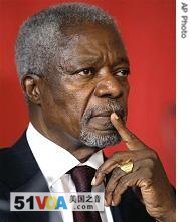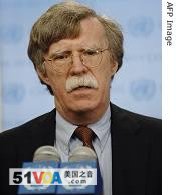Washington
22 May 2009
The United States has just been elected to the United Nations Human Rights Council.
 |
| Kofi Annan (file photo) |
Anne Bayevsky, a U.N. expert with the Hudson Institute, says the council replaced the 53-member Human Rights Commission.
"The commission was composed of many countries who were major human rights abusers," she said. "At one point in recent history, Libya was the chair of the Human Rights Commission. And it simply became discredited because of its very poor performance in dealing with major human rights catastrophes."
Many analysts say what began as a genuine effort to create a new council, produced in the end a body very similar to the old commission. Attempts to reform the election process and put strict membership criteria on the countries sitting on the new council were - in the end - watered down by many U.N. members.
 |
| John Bolton (file photo) |
"We thought that was a pretty simple, straightforward provision. But a lot of countries objected to it and the Europeans finally agreed that they would not insist on it. That to me was the final sign that this new body was going to be, at best, no different from its predecessor," he added.
The United States along with three other countries - Israel, Marshall Islands and Palau - voted against the creation of the council. Washington also decided not to stand for election to the new U.N. body.
Analysts say the majority of the council's members - 25 out of 47 - are rated by the Freedom House human rights organization as countries that are either 'not free' or 'partly free.' Experts say the council also has members that are cited for human rights abuses such as Russia, China, Saudi Arabia, Cuba and Kyrgyzstan.
Nancy Soderberg was former alternate U.S. representative to the United Nations during the Clinton administration (1997 - 2001). She says one positive note is that some of the worst human rights offenders who were on the commission are no longer on the new council.
"So you don't see the Irans on there anymore," said Soderberg. "You don't see the Zimbabweans and other countries who pro-actively got elected to these bodies with the express purpose of trying to keep them from doing anything. And they did. It's not perfect, it hasn't done as much as human rights activists would like - but it's progress."
But Anne Bayevsky says the council's record has been dismal. "In the last three years, the Human Rights Council has abolished human rights investigations that even had occurred under the commission on countries like Iran and Belarus and Cuba and Kyrgyzstan and Uzbekistan and Turkmenistan and so on," she said.
"They just eradicated human rights investigations in all these countries because human rights abusers hold the balance of power and that's the way they want it," she continued.
Many experts say after just three years in existence, the U.N. Human Rights Council is already in need of serious reform.
Michael Doyle, former special adviser to then U.N. Secretary-General Kofi Annan, says changes must first happen in the way members are elected to the council.
"I'd like to have a change in the election procedures so that there are more candidates than places for every region," he said. "Number two - I would like to see the countries that are running have as a platform an evaluation of their own human rights practices and a platform statement about what their candidacy will contribute to the furthering of human rights. So in other words I'd like to see a real election and a substantive campaign - those are the two things I think would be very important reforms for the institution."
 |
| Susan Rice |
But despite those positive words, many experts question whether Washington will be able to push through substantive reforms given the current composition of the council.